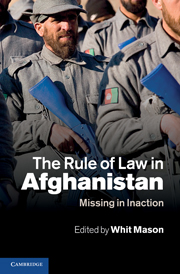Book contents
- Frontmatter
- Contents
- Contributors
- Preface and acknowledgements
- 1 Introduction
- PART I The scope and nature of the problem
- PART II The context
- PART III The political economy of opium
- PART IV Afghan approaches to security and the rule of law
- PART V International interventions
- PART VI Kandahar
- PART VII Conclusion
- Index
- References
1 - Introduction
Published online by Cambridge University Press: 01 June 2011
- Frontmatter
- Contents
- Contributors
- Preface and acknowledgements
- 1 Introduction
- PART I The scope and nature of the problem
- PART II The context
- PART III The political economy of opium
- PART IV Afghan approaches to security and the rule of law
- PART V International interventions
- PART VI Kandahar
- PART VII Conclusion
- Index
- References
Summary
Inevitably, for an ambitiously interdisciplinary book, this one is bound to be mislabelled. It may be shelved under ‘law’ or ‘international relations’ or perhaps, now that the country has become the focus of such voluminous study, under ‘Afghanistan’. Its real genre is ‘mystery’.
The mystery, involving millions of victims and at least thousands of suspects, is this.
Since the attacks of September 11, 2001, NATO and allied countries, led by the US, have considered it strategically imperative to help create a government in Afghanistan that is supported by the population and committed to not allowing terrorists to use the country as a safe haven. The richest, most powerful countries in the world have duly sacrificed hundreds of their own people's lives and spent billions of dollars to help secure Afghanistan and bring it a modicum of justice. And what, in terms of the human security and justice that is the sine qua non of stability, has it all achieved? The government has issued a decree granting immunity to the legions of warlords and gunmen who have tormented their own people for decades. The President's people stuffed ballot boxes to see him re-elected in a thoroughly discredited process. Prisons are full of people who have committed no crime but are too poor to bribe their way out of trouble, while serious criminals can pay enough to avoid ever serving their sentences.
- Type
- Chapter
- Information
- The Rule of Law in AfghanistanMissing in Inaction, pp. 1 - 12Publisher: Cambridge University PressPrint publication year: 2011
References
- 3
- Cited by

